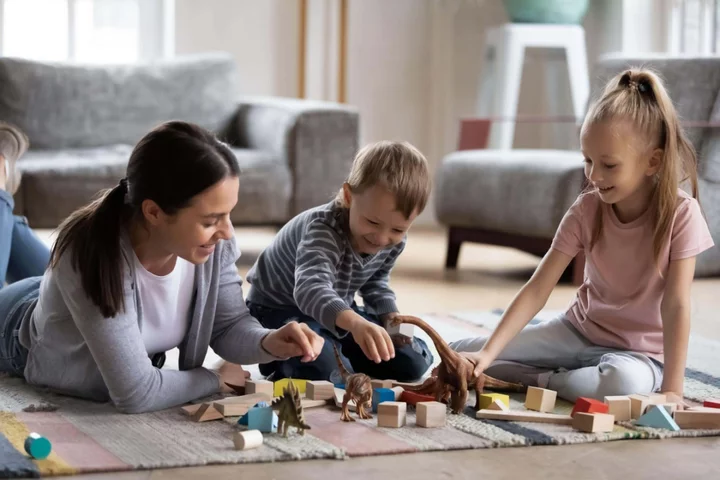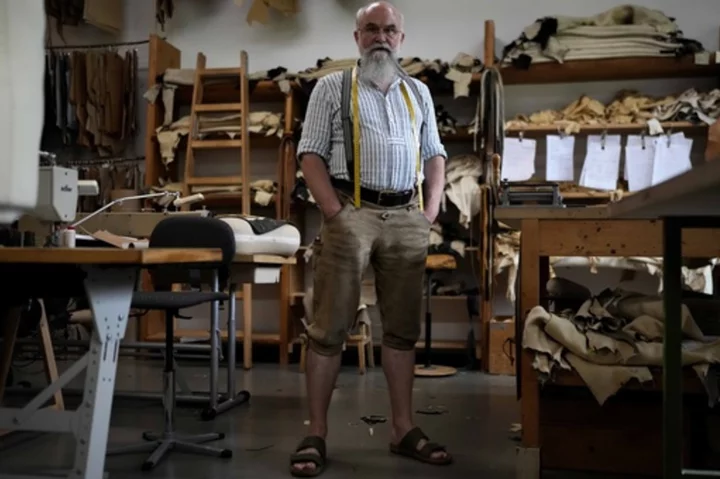
Action needed to protect women from birth trauma – MP
More must be done to protect women from birth trauma, a Tory MP has said after a new poll revealed that traumatic births have prevented a significant proportion of women from having more children. Theo Clarke said that it was “vitally important” that women receive the care and support they need after a traumatic birth. It comes after a poll of members of the Mumsnet community found that more than half (53%) who had suffered birth trauma said their experience put them off having more babies. The MP for Stafford has previously spoken out about her own birth story, where she described how she thought she was “going to die” after suffering a third degree tear and needing emergency surgery. She has since set up an All Party Parliamentary Group (APPG) on Birth Trauma to try to highlight the plight of thousands of women who suffer similar situations each year. A poll of 1,000 members of the Mumsnet website, shared with the PA news agency, found that 79% of those surveyed had experienced birth trauma. While the poll does not represent all mothers across the UK, it provides a snapshot of the experiences of those who use the popular parenting site. The survey also found that 72% of those who had experienced birth trauma said their issue had not been resolved a year after giving birth. Among those who had experienced physical, emotional or psychological birth trauma, 44% said healthcare professionals used language which implied they were “a failure or to blame” for the experience. Three quarters (76%) of all of those polled said they felt that health professionals had become “desensitised” to birth trauma. Almost two thirds (63%) said they did not believe healthcare workers did everything they could to prevent birth trauma. And 64% said they felt a “lack of compassion” from healthcare professionals during labour. Commenting on the poll, Ms Clarke said: “These survey results are deeply upsetting. They speak to my own experience of birth trauma and quite clearly to many, many other women’s horrendous experiences too. “That more than half of women across the UK who responded say they are less likely to want another child because of their birth experiences and they were made to feel they were to blame is simply terrible. “The survey is clear that more compassion, education and better after-care for mothers who suffer birth trauma are desperately needed if we are to see an improvement in mums’ physical wellbeing and mental health. “The APPG is now up and running in Parliament and will continue to listen to mothers and experts to drive fundamental change in how we treat mums. Our ambition is for birth trauma to be included in the Government’s women’s health strategy. “It is vitally important women receive the help and support they deserve.” Mumsnet chief executive Justine Roberts said: “We hear daily on Mumsnet from women who have had deeply upsetting experiences of maternity care, and this latest research underlines that the majority of mothers experience birth trauma – whether physical or psychological. “This trauma has long-lasting effects and it’s clear that women are being failed at every stage of the maternity care process – with too little information provided beforehand, a lack of compassion from staff during birth, and substandard postnatal care for mothers’ physical and mental health.” Kim Thomas, chief executive of the Birth Trauma Association, added: “It is time for a complete overhaul in the way women experience maternity. “This should include: honest, evidence-based antenatal education; compassionate and professional care during labour; and postnatal care that is designed to identify and treat every birth injury or mental health problem. “A maternity system that puts women at the heart of care is not some kind of unfeasibly high goal – it is the bare minimum that women have the right to expect.” A Department of Health and Social Care spokesperson said: “We are committed to making the NHS the safest place in the world to give birth, and improving support for women before, during and after pregnancy is a priority in the Women’s Health Strategy. “We are investing an additional £165 million per year to grow and support the maternity workforce and improve neonatal care. NHS England recently published a three-year plan to make maternity and neonatal care safer, more personalised, and more equitable for women, babies, and families. “To support women following trauma related to their maternity experience, we are rolling out 33 new maternal mental health services, which will be available across England by March 2024.” Read More Charity boss speaks out over ‘traumatic’ encounter with royal aide Ukraine war’s heaviest fight rages in east - follow live Imagination and hard work in children trumps obedience – research finds 7 ways you could be damaging your eye health without even realising Celebrities mingle with royals at glam Vogue World party in London
2023-09-15 16:18

Imagination and hard work in children trumps obedience – research finds
Imagination trumps obedience when it comes to what the public thinks are important qualities in children, according to new research. But while British attitudes have changed in the past three decades, children being taught good manners at home is still highly rated among the majority of people, the wide-ranging survey found. Some 85% of people in 2022 saw good manners as especially important for children, down only slightly on the 89% who said so in 1990, research by the Policy Institute at King’s College London (KCL) showed. Good manners are still the quality we want to see most, there has been an increasing emphasis on the importance of hard work, and we’re also among the very most likely to value unselfishness Professor Bobby Duffy Obedience is now far less valued, the analysis of the long-running World Values Survey (WVS) found, with just 11% of those asked last year citing it as being an especially important quality for children to be taught, down from a peak of 50% who felt that way in 1998. More people now think qualities including independence and hard work are important things for a child to be taught, with the former up to 53% last year from 43% in 1990, and the latter having risen from 29% to 48%. Around four in 10 (41%) people said determination and perseverance were important, up from 31% three decades earlier, while more than a third (37%) felt imagination was important, up from less than a fifth (18%) in 1990. Tolerance and respect for others are still among the qualities seen as very important, coming just behind good manners at the top of the list, but it is now seen as less important that a child is taught to be unselfish, the research found. More than half (56%) of people thought it was especially important for a child to be taught not to be selfish back in 1990, but that fell to 43% last year. Of the 24 countries surveyed, the UK is among the most likely to value unselfishness in children and among the least likely to value responsibility and obedience, researchers said. More people in Japan, Norway, Sweden and South Korea felt imagination was very important for children to have, while only five countries (Egypt, Philippines, Morocco, Nigeria and Mexico) were above the UK in valuing good manners in children. Professor Bobby Duffy, director of the Policy Institute at KCL, said: “The qualities we’d like to see instilled in our children are important signals of what we value as a society – and the very clear message from these long-term trends is the increased importance of imagination and decline in how much we prize straightforward obedience. “But this doesn’t mean we want a society of self-centred children – good manners are still the quality we want to see most, there has been an increasing emphasis on the importance of hard work, and we’re also among the very most likely to value unselfishness. “Instead, this is likely to reflect a more general shift towards valuing self-expression, while still wanting our children to be positive and productive contributors to society.” The 2022 data comes from a sample of 3,056 adults across the UK interviewed by Ipsos through a mix on face-to-face and online survey methods, but for the analysis of trends over time, data is nationally representative for Great Britain only due to a lack of available trend data from Northern Ireland, and is based on surveys of 1,000 or more adults. Read More Charity boss speaks out over ‘traumatic’ encounter with royal aide Ukraine war’s heaviest fight rages in east - follow live 7 ways you could be damaging your eye health without even realising Celebrities mingle with royals at glam Vogue World party in London Sienna Miller bares baby bump at celebrity and royal-studded Vogue event
2023-09-15 15:45

7 ways you could be damaging your eye health without even realising
Our eyesight is often something we take for granted – until there’s something wrong with it. Problems like short-sightedness (myopia) are rapidly increasing. In fact, research has predicted that by 2050 there will be 4,758 million people with the condition – nearly half (49.8%) of the world’s population – as experts are highlighting ahead of National Eye Health Week (September 18-24) In addition, new research by Macushield found 73% of Brits notice their eyes deteriorating with age, and the World Health Organisation’s (WHO) World Report on Vision has predicted a dramatic increase in the need for eyecare in the near future, pointing out that at least 2.2 billion people globally have a vision impairment – and around half of these have vision impairment that could have been prevented. “Some people may not be giving their eye health the attention it deserves, occasionally missing out on annual eye tests, which play a crucial role in detecting conditions like cataracts, glaucoma, and age-related macular degeneration,” says ophthalmologist Dr Jørn Slot Jørgensen. “When identified and addressed in a timely manner, these issues can be managed effectively, helping safeguard our vision.” Jørgensen says the pandemic also played a role in worsening eye problems, particularly the increase in short-sightedness. “With the shift to remote work, people are now more likely to spend extended hours with their screens for work and leisure,” he says. “Prioritising eye health isn’t just a matter of convenience, it’s a fundamental aspect of our overall wellbeing.” Here Jørgensen, of the Laser Eye Clinic London, and Evelyn (Evie) Mensah, a consultant ophthalmologist and eye surgeon at Central Middlesex Hospital and member of The Royal College of Ophthalmologists council, outline seven ways people may be damaging their vision, without even realising… 1. Skipping eye tests Mensah says it’s advisable for people to have a sight test every two years, or more often if their optometrist recommends it. Jørgensen adds: “Failing to schedule regular eye tests can result in undiagnosed eye conditions. Conditions like glaucoma, diabetic retinopathy, and macular degeneration often develop without noticeable symptoms in their early stages, but early detection through eye tests is crucial for effective treatment and vision preservation.“ Routine eye tests can also pick up early signs of underlying systemic health conditions, such as diabetes, high cholesterol and high blood pressure. 2. Prolonged screen time The widespread use of digital devices such as laptops, tablets and smartphones has led to extended periods of screen time for both work and leisure, says Jørgensen. “This can result in digital eye strain, characterised by symptoms like dry eyes, headaches and blurred vision,” he explains. “In this age of digital technology, it’s advisable to relieve digital eye strain by using the 20-20-20 rule,” says Mensah – this means every 20 minutes, looking at something 20ft away for 20 seconds. “In addition, remember to blink when using a screen to prevent eyes from getting dry.” 3. Not wearing UV protective sunglasses Jørgensen says failing to wear sunglasses with adequate UV protection can lead to harmful UV radiation exposure, which may contribute to conditions like cataracts and age-related macular degeneration (AMD). “Protecting your eyes from UV rays, particularly in sunny conditions, is essential for preserving long-term eye health,” he stresses. Mensah says UV exposure can also increase the development of growths on the surface of the eyes called pterygia, and warns: “Not all sunglasses filter UV light, so ensure they carry the CE, UV 400 or British Standard Mark. And never look directly at the sun because this can cause a solar burn in the macula that can result in permanent visual loss.” 4. Poor diet and lack of nutrients Eating a healthy, balanced diet could help reduce your risk of sight-threatening eye disease such as AMD, which impacts central vision. Mensah explains that the macula – part of the retina which processes what you see directly in front of you – contains natural pigments such as lutein and zeaxanthin that are found in dark-green, leafy vegetables such as spinach and kale. “Vitamins A, C and E are also helpful, so eat at least five portions of fruit and vegetables a day,” she advises. “And if you have a family history of AMD, ask your GP about taking nutritional supplements.” Jørgensen adds: “A poor diet lacking essential nutrients like vitamins A, C, and E, as well as minerals like zinc, can harm eye health, as these nutrients are vital for vision and overall eye function. To maintain healthy eyes, it’s crucial to consume a balanced diet rich in leafy greens, colourful fruits and vegetables, and omega-3 sources.” 5. Smoking If you’re a smoker, stopping is not only beneficial to your general health but also your eyes, says Mensah: “Smoking cessation is a modifiable factor that can reduce the risk of developing certain eye conditions such as AMD and cataracts.” Ask your GP for support if you are keen to quit – there are lots of helpful resources available. 6. Not wearing prescribed glasses Mensah says there’s a widespread misconception that wearing prescribed glasses worsens your eyesight. “This notion is inaccurate,” she stresses. “The primary reason for wearing prescribed glasses is simply because you require them. If you neglect to wear them, you run the risk of experiencing headaches.” 7. Inadequate lighting “Working or reading in areas with insufficient lighting can make your eyes work harder, leading to eye strain, discomfort, and poorer vision,” says Jørgensen. He points out that good lighting, often called ‘task lighting’, is vital for creating comfortable conditions for reading and working. Read More Charity boss speaks out over ‘traumatic’ encounter with royal aide Ukraine war’s heaviest fight rages in east - follow live Celebrities mingle with royals at glam Vogue World party in London Sienna Miller bares baby bump at celebrity and royal-studded Vogue event See plus-size model Ashley Graham stun in Old Hollywood-inspired Harris Reed LFW show
2023-09-15 15:16

A German tailor who specializes in bespoke lederhosen is in high demand ahead of Oktoberfest
Germany’s city of Munich is getting ready to tap the kegs for Oktoberfest
2023-09-15 14:20

Parts of coastal New England and Atlantic Canada are under tropical storm warnings as Hurricane Lee nears
Hurricane Lee is expected to lash parts of coastal New England and Atlantic Canada on Friday with heavy rain and strong winds that could lead to flooding in some areas and knock out power across communities.
2023-09-15 13:26

Australia's measures to bolster energy security hits LNG industry
SINGAPORE The Australian government implemented a series of regulations and measures in the gas industry to meet domestic
2023-09-15 12:27

Huawei Used Years-Old Hynix Memory Tech in Mate 60 Phones
Huawei Technologies Co.’s controversial Mate 60 phones use SK Hynix Inc. memory that has been available for years,
2023-09-15 11:56

Video shows school employee hitting 3-year-old nonverbal autistic child in the head and knocking him to the floor, attorney alleges
Video from an Ohio school's hallway camera shows a school employee chasing a 3-year-old down the hall and hitting him in the head from behind, knocking him to the ground, an attorney for the boy's family alleges.
2023-09-15 11:24

UAW Calls for Strike Against Automakers as Contract Talks Break Down
The United Auto Workers will strike three plants at each of the legacy Detroit carmakers if a new
2023-09-15 11:21

Disney holds preliminary talks with Nexstar on ABC sale -sources
By Dawn Chmielewski (Reuters) -Walt Disney Co has held exploratory discussions about selling its U.S. TV network ABC to regional
2023-09-15 11:15

China’s Economy Picks Up in August on Travel Boom, Policy Push
China’s economic activity gathered pace in August amid a summer travel boom and in the wake of a
2023-09-15 10:58

UK, France and Germany to keep nuclear sanctions on Iran
The three nations say Iran is in breach of the 2015 nuclear deal by producing enriched uranium.
2023-09-15 10:20
